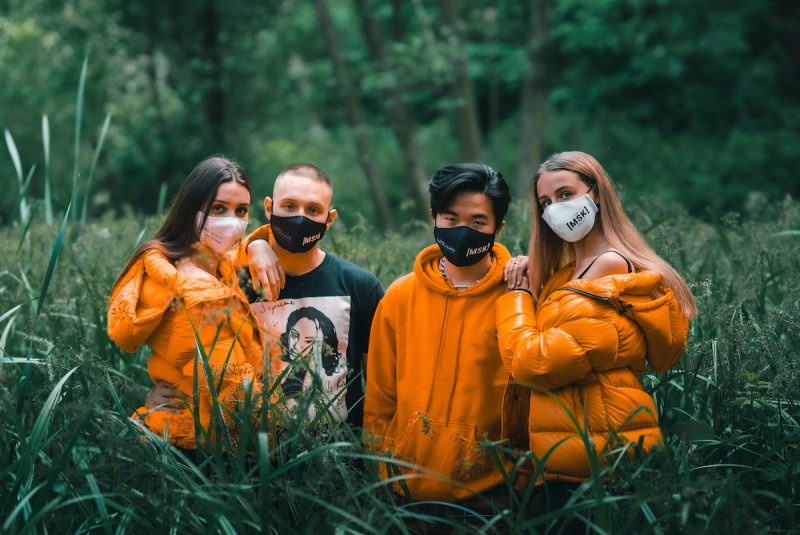Unmasking the oceans from COVID-19 plastic pollution
The [MSK] Project is creating an immediate impact by helping the world stop ocean plastic pollution.
By SeaWestNews
COVID-19 has had a number of unexpected impacts on the environment, curtailing recycling and increasing the use of plastic around the world.
Adding to the over eight million metric tons of plastic that end up in the world’s oceans each year now are plastic in masks, gloves, hand sanitizer bottles, protective medical suits, test kits, and takeout containers and other items central to the new pandemic way of life.
In countries where waste collection and recycling systems have failed to keep pace with rising amounts of rubbish, used plastic is often dumped near waterways or incinerated, fouling the air, water and soil.
To help combat this growing environmental crisis, a group of young Vancouver-area entrepreneurs have come together to help protect the oceans from COVID-19 generated plastics.
Riel Wardrobe, a sustainable clothing brand, is joining forces with Plastic Bank, a social enterprise committed to stopping ocean plastic pollution to launch The [MSK] Project.
All sale proceeds of Riel’s new sustainably-made, reusable, cotton non-medical masks is being channelled to stop COVID-19 related plastic waste from entering the oceans.
The [MSK] Project said every mask purchased prevents 3.5 kg of plastic waste from entering the ocean, the equivalent of 175 half-litre plastic bottles.
This unique Canadian initiative was conceptualized by Noah Kent and Luke Davis, co-founders of multimedia agency Octane Collective and the driving force behind this collaboration.
“As a generation, we can foresee how this will impact our future, and it is vital we partner with companies like Plastic Bank to protect our oceans and planet now,” said Tyler Preston, co-owner of Riel Wardrobe, who founded the company with university classmate Ryan Nassab.
“Our masks are 100 percent reusable and are also accessible, sustainable, and easy to wear.”
“Young people are our champions and our future, and Riel Wardrobe is the perfect example of what can be done with great minds,” said Noah Katz of Plastic Bank.
“They are creating immediate impact by helping the world stop ocean plastic while improving the lives of collector communities.”
Each mask is $29.99 CAD with free shipping, and available on www.rielwardrobe.com.

Meanwhile, Bernadette Jordan, Canada’s Minister of Fisheries and Oceans has announced four small businesses will receive grants to expand their innovative work to minimize plastics pollution by recycling fishing and aquaculture equipment.
The over $2 million in funding is part of the second phase of the domestic plastics challenges under the Innovative Solutions Canada program, which invited Canadian small businesses to develop innovative technologies to reduce plastic waste and keep valuable resources circulating in our economy.
The following small businesses will receive continued funding to expand their projects:
Ashored Innovations Inc. from Nova Scotia will receive $702,000 to design and build a low-cost, commercially viable, and acoustically activated rope-less fishing system for use in the lobster and crab fisheries. The funding will also help Ashored Innovations to further develop their rope-less fishing system, which includes a rope re-spooler and user-friendly gear-tracking software for lobster and crab fisheries.
Goodwood Plastic Product Ltd. from Nova Scotia will receive $475,000 to implement and increase production at their new manufacturing facility to turn end-of-life plastic fishing nets and ropes into plastic lumber products and to incorporate them into new pre-cast plastic products.
Plantee Bioplastics Inc. from Ontario will receive $475,000 to develop a “smart” biodegradable plastic polymer fishing line, and to apply this technology in the creation of other types of biodegradable plastic products for commercial and recreational fishing and aquaculture. The new technology will increase the lifecycle of products by slowing their degradation while they are in use, then accelerating it when the products are discarded.
Ocean Legacy Technologies from British Columbia will receive $360,000 to build a small marine plastics processing facility to enhance current efforts in marine plastic recovery and recycling. Using innovative technologies, this facility will allow select plastic materials from fishing and aquaculture sectors to be repurposed and recycled, including plastics with some organic or non-organic contamination, and some found during shoreline clean-ups. The unique program bridges partnerships between business, industry, government and non-profit sectors to take critical steps forward to create a value chain in an emerging ocean plastics industry.
“As we maneuver through this pandemic, I’m proud to be supporting local small businesses from across Canada on their important, innovative work to develop real solutions that will help reduce the environmental impacts plastics have on our oceans,” said Jordan.

